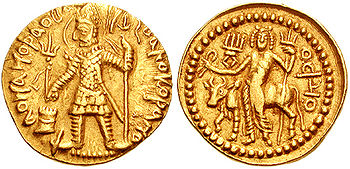
Vasudeva I
Encyclopedia

Kanishka
Kanishka ) was an emperor of the Kushan Empire, ruling an empire extending from Bactria to large parts of northern India in the 2nd century of the common era, and famous for his military, political, and spiritual achievements...
's era suggest his reign extended from at least 191 to 225 CE.
The last named inscription of his predecessor, Huvishka, was in the year 60 = 187 CE, and the Chinese evidence suggests he was still ruling as late as 229 CE. He was the last great Kushan emperor, and the end of his rule coincides with the invasion of the Sassanians as far as northwestern India, and the establishment of the Indo-Sassanians or Kushanshahs from around 240 CE.
His name, Vasudeva
Vasudeva
In Hindu itihasa , Vasudeva is the father of Krishna, the son of Shoorsen, of the Yadu and Vrishni dynasties. His sister Kunti was married to Pandu. He was a partial incarnation of Rishi Kashyap....
, is that of the father of Krishna
Krishna
Krishna is a central figure of Hinduism and is traditionally attributed the authorship of the Bhagavad Gita. He is the supreme Being and considered in some monotheistic traditions as an Avatar of Vishnu...
, the popular Hindu
Hindu
Hindu refers to an identity associated with the philosophical, religious and cultural systems that are indigenous to the Indian subcontinent. As used in the Constitution of India, the word "Hindu" is also attributed to all persons professing any Indian religion...
god, and he was the first Kushan king to be named after an Indian god. He converted to Hinduism
Hinduism
Hinduism is the predominant and indigenous religious tradition of the Indian Subcontinent. Hinduism is known to its followers as , amongst many other expressions...
during his reign.
Contacts with China
In the Chinese historical chronicle Sanguozhi (三國志), he is recorded to have sent tribute to the Chinese emperor Cao RuiCao Rui
Cao Rui , formally known as Emperor Ming of Wei, was the second emperor of the state of Cao Wei during the Three Kingdoms period of Chinese history. He was a son of Cao Wei's first emperor Cao Pi according to Liu Song dynasty historian, Pei Songzhi, but was a son of Yuan Xi according to modern...
of the Wei in 229 CE (3rd year of Taihe 太和), :
- "The king of the Da Yuezhi, Bodiao (波調) (Vāsudeva), sent his envoy to present tribute and His Majesty granted him a title of "King of the Da Yuezhi Intimate with Wei (魏)"." (Sanguozhi)
He is the last Kushan ruler to be mentioned in Chinese sources. His rule corresponds to the retreat of Chinese power from Central Asia
Central Asia
Central Asia is a core region of the Asian continent from the Caspian Sea in the west, China in the east, Afghanistan in the south, and Russia in the north...
, and it is thought that Vasudeva may have filled the power vacuum in that area. The great expansion of the Dharmaguptaka
Dharmaguptaka
The Dharmaguptaka are one of the eighteen or twenty early Buddhist schools, depending on one's source. They are said to have originated from another sect, the Mahīśāsakas...
Buddhist group in Central Asia during this period has also been related to this event.
Christian connection
Vasudeva may have been the Indian king who returned the relics of the Apostle St. ThomasThomas the Apostle
Thomas the Apostle, also called Doubting Thomas or Didymus was one of the Twelve Apostles of Jesus. He is best known for questioning Jesus' resurrection when first told of it, then proclaiming "My Lord and my God" on seeing Jesus in . He was perhaps the only Apostle who went outside the Roman...
from Mylapore
Mylapore
Mylapore is a cultural hub and neighborhood in the southern part of the city of Chennai, the capital of Tamil Nadu, India. Earlier, Mylapore used to be called Vedapuri....
, India
India
India , officially the Republic of India , is a country in South Asia. It is the seventh-largest country by geographical area, the second-most populous country with over 1.2 billion people, and the most populous democracy in the world...
in 232 CE, on which occasion his Syriac Acts (the 3rd century Acts of Thomas
Acts of Thomas
The early 3rd century text called Acts of Thomas is one of the New Testament apocrypha, portraying Christ as the "Heavenly Redeemer", independent of and beyond creation, who can free souls from the darkness of the world. References to the work by Epiphanius of Salamis show that it was in...
) were written. The relics were transferred triumphally to the town of Edessa, Mesopotamia
Edessa, Mesopotamia
Edessa is the Greek name of an Aramaic town in northern Mesopotamia, as refounded by Seleucus I Nicator. For the modern history of the city, see Şanlıurfa.-Names:...
. The Indian king is named as "Mazdai" in Syriac sources, "Misdeos" and "Misdeus" in Greek and Latin sources, which has been connected to the "Bazdeo" on the Kushan coinage of Vasudeva, the transition between "M" and "B" being a current one in Classical sources for Indian names. Rabban Sliba dedicated a special day to both the Indian king, his family, and St Thomas:
- "Coronatio Thomae apostoli et Misdeus rex Indiae, Johannes eus filius huiusque mater Tertia" ("Coronation of Thomas the Apostole, and Misdeus king of India, together with his son Johannes (thought to be a Latinization of Vizan) and his mother Tertia") Rabban Sliba

